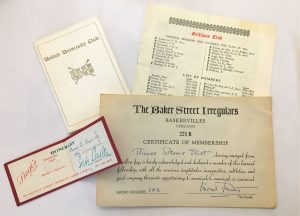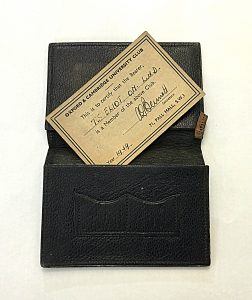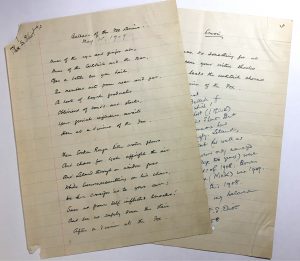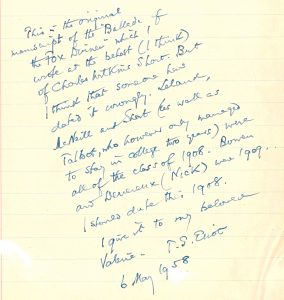T. S. Eliot in a letter to Virginia Woolf, 27 April 1937.

A look through Eliot’s letters and personal papers reveals that he was a member of several clubs – quiet, private places where he could meet or play host to business and personal acquaintances and friends. There were the more traditional London clubs such as Grillions, Siegi’s in Mayfair, the Garrick Club in the West End, the Oxford & Cambridge Club (Eliot’s membership card from 1949 remains in his leather card holder) and the Athenaeum, both on Pall Mall. Then there are the more interestingly titled clubs such as The Baker Street Irregulars for Sherlock Holmes enthusiasts, The Cliff Dwellers Club (he had temporary membership in 1950) and Michael Mullins Marching & Chowder Club, a Harvard undergraduate club to which he was given honorary membership during his time in America between 1932 and 1933. He was also a member of a Christian club, mentioned in a letter to Kathleen Bliss in 1950, ‘I belong to a small ecumenical dining club. …limited to fourteen members who represent, according to quota, the Anglican, Methodist, Presbyterian, Congregational, and Baptist denominations’.

Eliot’s clubman days began while he was at Harvard. During his time as a philosophy undergraduate (1906–1909), he joined several university societies, including the Southern Club and the Digamma Club – later renamed the Fox Club. The Digamma, which recently made the news when it decided to revert back to male-only membership, was founded by six students in 1898. Founding member William R. Castle wrote that the club ‘stands primarily for friendship but not for friendship in a narrow or snobbish sense. We have never inquired into the size of a man’s cash account nor scrutinized his ancestral tree … we have never been guilty of the inverted snobbishness which condemns a man because he is rich or because his blood stream is blue … We have always respected and sought after the good things of the mind…’ (Fifty Years, 1949). The clubhouse at 44 Boylston Street (now John F. Kennedy Street) ‘was an exclusive, all-male space where well-off young men could socialise, dine, drink and make merry in very fine surroundings. Boasting three storeys and a substantial basement, the detached building was ornamented with imitation classical columns at its corners’ (Crawford, 2015).
As with every new member, Eliot was initiated by way of a secret ritual, and he went on to act as Treasurer (1909–1910) and Librarian (1910–1911). He had several friends and acquaintances at the club including Leon Magaw Little who was Fox Club Secretary from 1909 to 1910, and later Secretary to the Class of Harvard 1910. It was for the Fox Club that Eliot experimented with doggerel sexual poems and introduced the characters of Bolo and Columbus (which can be found in The Complete Poems of T. S. Eliot). A Fox Club tradition was the recital of songs at club dinners. Former song writers included John Harvard and Hermann Hagerdorn whose drinking song was printed for the club housewarming of November 1906. It was Eliot’s turn in 1909 when a ‘Brother Fox’ asked him to write a ballad for an upcoming dinner and on Saturday 15 May he recited the ‘Ballade of the Fox Dinner’ to his fellow club members. His poem spoke of drinking, merriment, and the long-lasting bonds of friendship. The poem was published in full for the first time forty years later in William R. Castle’s volume Fifty Years.
Muse of the rye and ginger ale,
Muse of the Cocktail and the Bar,
Open a bottle ere you hail
The members met from near and far.
A host of loyal graduates
Oblivious of bonds and stocks,
Your genial influence awaits
Here at a dinner of the Fox.
The original manuscript of the poem, written when Eliot was twenty, remained with the Fox Club until 1958 when the then Undergraduate Secretary, Jonathan H Morgan, discovered the poem in the club’s archives. Morgan wrote to Eliot offering the poem back and invited him to join them for cocktails when he was next in Cambridge. Eliot accepted the invitation, confessing that he had been too shy to walk into the club when he was last there, ‘I passed the Club several times and wondered whether to walk in and introduce myself to anybody present or not. Sometimes an old buffer who has not been seen for a long time feels as timid as the newest member!’

He was delighted to have the poem returned, not least because his young wife Valerie would be ‘still more pleased to have such a curiosity to add to her collection’. He collected the manuscript from the club and soon after annotated the last page, ‘This is the original manuscript of the “Ballade of the Fox Dinner” which I wrote at the behest (I think) of Charles Witkins Short…’. He believed that the poem had been misdated as the students he mentions were all of the class of 1908. Eliot gave the manuscript to Valerie and it remains in our collection today.



